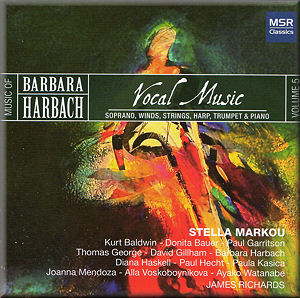 |
 |
|


alternatively
CD: AmazonUK
AmazonUS
|
Barbara HARBACH
Abigail! (2007) [13:21]
Pleasure Flow, Tender Mist (2003) [12:21]
Emily! (2007) [9:52]
Light Out of Darkness (2005) [4:46]
Cherish – Caress (2002) [4:31]
Pioneer Women: From Skagway to White Mountain (1994) [20:57]
Twenty–First Century Pioneer (2007) [4:14]
 Stella Markou (soprano) with Paula Kasica (flute); Paul Garritson
(clarinet and bass clarinet); Donita Bauer (bassoon); Ayako Watanabe
(harp); David Gillham (violin); Joanna Mendoza (viola); Kurt Baldwin
(cello); James Richards (conductor) (Abigail!); Alla Voskoboynikova
(piano) (Pleasure, Emily! And Light); Paul Hecht (trumpet) (Emily!);
Diana Haskell (clarinet); Barbara Harbach (piano) (Pioneer Women);
Thomas F George (piano) (21st Century)
Stella Markou (soprano) with Paula Kasica (flute); Paul Garritson
(clarinet and bass clarinet); Donita Bauer (bassoon); Ayako Watanabe
(harp); David Gillham (violin); Joanna Mendoza (viola); Kurt Baldwin
(cello); James Richards (conductor) (Abigail!); Alla Voskoboynikova
(piano) (Pleasure, Emily! And Light); Paul Hecht (trumpet) (Emily!);
Diana Haskell (clarinet); Barbara Harbach (piano) (Pioneer Women);
Thomas F George (piano) (21st Century)
rec. 3 – 8 June 2008, Touhill Performing Arts Center, University
of Missouri, St Louis, DDD
 MSR RECORDS MS 1256 [69:49]
MSR RECORDS MS 1256 [69:49] 
|
|
|
So far, in MSR’s survey of the music of Barbara Harbach, vocal
music has been conspicuously absent, an oddity, to say the least.
After all, apart from the music recorded here, Harbach has written
a musical, Booth! (concerning the brother of John Wilkes)
which played in New York last summer, and an opera, O Pioneers!,
based on the novel by Willa Cather, was given in St Louis last
October. Unfortunately, although O Pioneers! was broadcast
on KFUO St Louis - (which was available on the internet - if
you missed it that was it.) It’s a fine work, which needs repeated
hearings to really get into the piece, so one can only hope
for a national broadcast at some time, and thus a worldwide
audience could hear the work.
Until then, here are seven vocal works, which show the range
of Harbach’s vision.
Abigail! - Harbach seems to favour the exclamation mark
in the titles of her vocal works! - sets words from letters
between Abigail Smith Adams and John Adams, the second President
of the USA. Voice and harp make such a good combination, and
here they are complemented by wind and strings – it’s a beautiful
piece of vocal chamber music, well laid out for a small ensemble,
colourful and understated.
Pleasure Flow, Tender Mist sets words by Jonathan Yordy
– who wrote the libretti for both her musical Booth!
and her opera – and they are eminently singable words – not
always the case with contemporary verse. These are also very
singable songs. Relaxed and tender, they would grace any recital.
Emily! sets words by Emily Dickinson and who would have
thought that the combination of soprano, trumpet and piano would
work so well together! Dickinson the mystic is here treated
to music of ecstatic fervour which, due to the e trumpet, still
has its feet on the ground, planted firmly in the real world.
Harbach’s seeming simplicity – like Copland’s in his Dickinson
settings – heightens the emotion and passion of the words. Perhaps
the use of trumpet will militate against too many performances
so we must be grateful for this recording.
Pioneer Women: From Skagway to White Mountain sets words
from four women who “helped settle the wilds of Alaska”. This
is the longest work on the disk and it’s more dramatic and visionary
than the other pieces. But it’s not without a sense of fun.
With clarinet added to voice and piano, it is a major addition
to the repertoire for this combination of instruments.
The final three short pieces are delightful make–weights. Light
Out of Darkness sets words by Helen Keller; it’s a simple,
ecstatic chant. Cherish – Caress is a duet for voice
and cello, setting more words by Yordy, which is a fine essay
in how to write a really “singing” vocal line. The poem, however,
is rather twee and somewhat cringe–making. Finally, Twenty–First
Century Pioneer, is a blues, delivered in a lovely Southern
style, with a down–home drawl. Great fun.
It says much for the strength of Harbach’s work that she has
created vocal music which builds on the two great American composers
for the voice – Ned Rorem, who has probably done more for vocal
music in the past sixty years than anyone, and Aaron Copland,
whose 12 Poems of Emily Dickinson might just be the greatest
American composition for voice and piano – yet manages to find
her own truly American sound. As I have said before, when I
have had the great pleasure to report on the previous four CDs
of her music, she has forged a voice which is all her own, yet
speaks clearly in the American vernacular.
Don’t miss this disk for it is something very, very special.
The performances are excellent, committed and vibrant – Stella
Markou knows how to use her voice to best effect, and although
rather limited in her range of vocal colour, she makes up for
it in insight into the music – in excellent sound and with good
notes in the booklet.
Bob Briggs
|
|




 All Nimbus reviews
All Nimbus reviews








